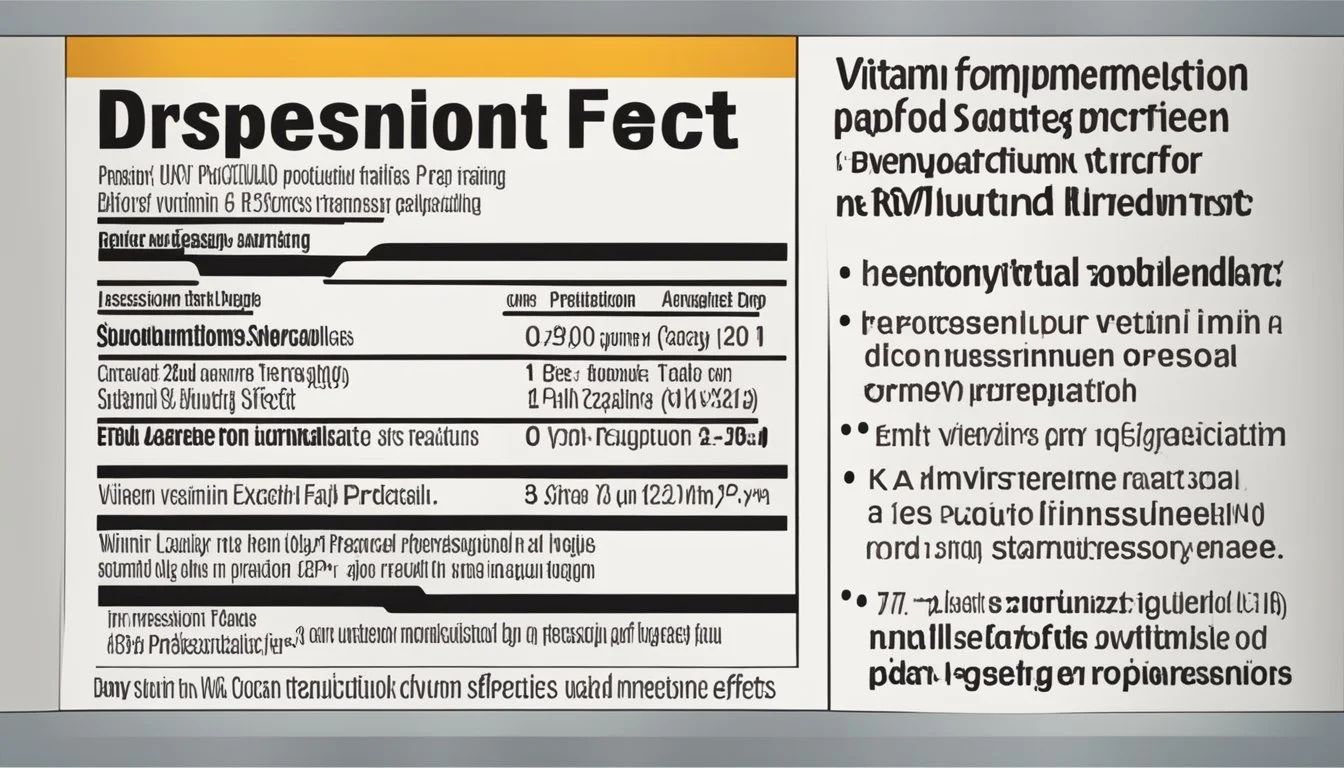Fighting Depression: The Power of Vitamin Supplements for Mental Health
Depression affects millions worldwide, impacting daily life and overall well-being. While professional treatment is essential, some individuals explore vitamin supplements as a complementary approach to managing symptoms. Research suggests certain nutrients may play a role in mood regulation and brain function.
Vitamin D, B complex vitamins, omega-3 fatty acids, and minerals like zinc and magnesium have shown potential in supporting mental health. These supplements work by influencing neurotransmitter production, reducing inflammation, and supporting cellular processes in the brain. However, it's crucial to note that supplements are not a substitute for medical care and should be discussed with a healthcare provider.
The effectiveness of vitamin supplements for depression can vary among individuals. Factors such as diet, genetics, and overall health status influence how one's body responds to supplementation. While some people report improvements in mood and energy levels, others may not experience significant changes. Integrating supplements as part of a comprehensive mental health plan, including therapy and lifestyle modifications, may yield the best results.
Understanding Depression
Depression is a complex mental health disorder affecting millions worldwide. It involves changes in brain chemistry, thought patterns, and physical health. Biological factors like neurotransmitter imbalances and inflammation play key roles alongside environmental stressors.
Symptoms of Depression
Depression manifests through various emotional, cognitive, and physical symptoms. Common signs include:
Persistent sadness or low mood
Loss of interest in activities
Changes in appetite and sleep patterns
Difficulty concentrating
Feelings of worthlessness or guilt
Fatigue and low energy
Thoughts of death or suicide
These symptoms often persist for weeks or months, interfering with daily functioning. Physical symptoms may include unexplained aches, pains, and digestive issues. Depression can also exacerbate existing health conditions.
Serotonin and Neurotransmitters
Neurotransmitters play a crucial role in mood regulation. Serotonin, often called the "feel-good" chemical, is particularly important in depression. Low serotonin levels are associated with depressive symptoms.
Other key neurotransmitters include:
Dopamine: Involved in motivation and pleasure
Norepinephrine: Affects energy and alertness
Imbalances in these brain chemicals can disrupt mood, sleep, appetite, and cognitive function. Many antidepressant medications work by altering neurotransmitter levels or activity in the brain.
The Role of Inflammation
Emerging research links inflammation to depression. Chronic inflammation may contribute to depressive symptoms and affect neurotransmitter function. Stress, poor diet, and lack of exercise can increase inflammation levels.
Key points about inflammation and depression:
Inflammatory markers are often elevated in depressed individuals
Inflammation may interfere with serotonin production
Anti-inflammatory treatments show promise in some depression cases
Addressing inflammation through lifestyle changes or medication may help alleviate depressive symptoms in some people. This connection highlights the complex interplay between physical and mental health in depression.
Vitamins and Mood Regulation
Certain vitamins play crucial roles in regulating mood and supporting mental health. These essential nutrients influence neurotransmitter production and brain function, potentially impacting emotional well-being.
Vitamin D and Sunlight Exposure
Vitamin D, often called the "sunshine vitamin," is synthesized in the skin when exposed to sunlight. Low levels of vitamin D have been linked to increased rates of depression and seasonal affective disorder.
Getting adequate sunlight exposure can help boost vitamin D production naturally. For those in less sunny climates, vitamin D supplements may be beneficial.
Research suggests that vitamin D receptors are present in areas of the brain associated with mood regulation. This vitamin also influences the production of serotonin, a neurotransmitter that affects mood.
Maintaining optimal vitamin D levels may help support emotional well-being and reduce the risk of mood disorders.
B Vitamins and Brain Health
B vitamins are essential for brain health and mood regulation. Vitamin B12, folate (B9), and B6 are particularly important for neurotransmitter production.
Vitamin B12 deficiency has been associated with depression symptoms. This vitamin is crucial for the production of S-adenosylmethionine (SAMe), a compound involved in mood regulation.
Folate works synergistically with B12 and is necessary for the synthesis of serotonin and dopamine. Low folate levels have been linked to depressive symptoms.
Vitamin B6 aids in the production of neurotransmitters like serotonin and GABA, which help regulate mood and promote relaxation.
Ensuring adequate intake of B vitamins through diet or supplements may support brain health and mood stability.
Vitamin C and Antioxidants
Vitamin C is a powerful antioxidant that plays a role in mood regulation and mental health. It is involved in the production of neurotransmitters, including serotonin and norepinephrine.
Studies have shown that vitamin C supplementation may help reduce symptoms of anxiety and depression in some individuals. Its antioxidant properties may protect brain cells from oxidative stress.
Vitamin C also supports the absorption of iron, which is essential for cognitive function and mood regulation. Iron deficiency has been linked to fatigue and depressive symptoms.
Consuming a diet rich in vitamin C or taking supplements may help support mood stability and overall mental well-being.
Dietary Supplements and Depression
Certain dietary supplements may help alleviate symptoms of depression when used alongside other treatments. Research has shown promising results for some nutrients and herbs in supporting mental health and mood regulation.
Omega-3 Fatty Acids and Fish Oil
Omega-3 fatty acids, found in fish oil, play a crucial role in brain function and mood regulation. Studies indicate that people with depression often have lower levels of omega-3s in their blood. Fish oil supplements, particularly those high in EPA (eicosapentaenoic acid), may help reduce depressive symptoms.
Fatty fish like salmon and sardines are rich natural sources of omega-3s. For those who don't consume enough fish, supplements can be beneficial. Cod liver oil is another option, providing both omega-3s and vitamin D.
Typical dosages range from 1-2 grams of EPA+DHA daily. It's important to choose high-quality supplements and consult a healthcare provider before starting any new regimen.
Magnesium and Nervous System Support
Magnesium is essential for nervous system function and mood regulation. Low magnesium levels have been linked to increased risk of depression. This mineral helps regulate neurotransmitters that influence mood and stress response.
Good dietary sources of magnesium include:
Nuts (almonds, cashews)
Seeds (pumpkin, sunflower)
Leafy greens (spinach, kale)
Whole grains
Magnesium supplements are available in various forms, with magnesium glycinate being well-absorbed and less likely to cause digestive issues. Typical dosages range from 200-400 mg daily.
Herbal Supplements: St. John's Wort and Others
St. John's Wort is an herb traditionally used for depression. Some studies suggest it may be as effective as certain antidepressants for mild to moderate depression. However, it can interact with many medications and should only be used under medical supervision.
Other herbs that may support mood include:
Saffron
Rhodiola rosea
Lavender
Melatonin supplements may help with sleep issues often associated with depression. Some people find 5-HTP helpful, as it's a precursor to serotonin, a mood-regulating neurotransmitter.
It's crucial to note that herbal supplements can have side effects and interactions. Always consult a healthcare provider before using them, especially if taking other medications.
Nutrition and Mental Health
Proper nutrition plays a crucial role in supporting mental health and emotional well-being. Specific nutrients and dietary patterns can influence mood, cognitive function, and overall mental state.
Role of Amino Acids
Amino acids are essential building blocks for neurotransmitters that regulate mood and behavior. Tryptophan, found in foods like turkey, eggs, and cheese, is converted to serotonin - a key mood-regulating neurotransmitter.
Tyrosine, present in high-protein foods, is a precursor to dopamine and norepinephrine, which affect motivation and alertness.
Glutamine, abundant in animal proteins, legumes, and nuts, supports the production of GABA, a calming neurotransmitter.
Ensuring adequate intake of these amino acids through diet or supplements may help maintain balanced brain chemistry and support mental health.
Impact of Deficiencies: Iron and Zinc
Iron deficiency can lead to fatigue, irritability, and difficulty concentrating. It affects the production of dopamine and the function of other neurotransmitters.
The Recommended Dietary Allowance (RDA) for iron is 8 mg/day for adult men and 18 mg/day for adult women.
Zinc deficiency is associated with depression and anxiety. This mineral is crucial for neurotransmitter function and brain health.
The RDA for zinc is 11 mg/day for adult men and 8 mg/day for adult women.
Addressing these deficiencies through diet or supplementation may improve mood and cognitive function.
Nutrient Sources for Vegetarians and Vegans
Vegetarian and vegan diets can provide adequate nutrition for mental health with careful planning.
Iron sources: Legumes, fortified cereals, dark leafy greens, and dried fruits. Consuming vitamin C-rich foods alongside iron sources enhances absorption.
Zinc sources: Whole grains, nuts, seeds, and legumes. Soaking or sprouting these foods can increase zinc bioavailability.
Protein sources: Legumes, nuts, seeds, and soy products provide essential amino acids.
B12, crucial for neurological function, requires supplementation or fortified foods in vegan diets.
Omega-3 fatty acids, important for brain health, can be obtained from algae-based supplements or flaxseeds.
Medical and Therapeutic Treatment Options
Depression treatment involves various approaches, including medications, therapy, and alternative remedies. These options aim to alleviate symptoms and improve overall mental health.
Pharmacological Antidepressants
Antidepressants are commonly prescribed medications for treating depression. Selective serotonin reuptake inhibitors (SSRIs) like fluoxetine and sertraline are often the first-line treatment. They work by increasing serotonin levels in the brain.
Other classes of antidepressants include serotonin-norepinephrine reuptake inhibitors (SNRIs), tricyclic antidepressants (TCAs), and monoamine oxidase inhibitors (MAOIs). Each type targets different neurotransmitters to regulate mood.
Doctors may adjust dosages or switch medications to find the most effective treatment with minimal side effects. It's crucial for patients to follow their prescribed regimen and communicate any concerns with their healthcare provider.
Therapy and Psychiatric Intervention
Psychotherapy plays a vital role in depression treatment. Cognitive-behavioral therapy (CBT) helps patients identify and change negative thought patterns and behaviors. It equips individuals with coping strategies to manage depressive symptoms.
Interpersonal therapy focuses on improving relationships and social functioning. Other therapeutic approaches include psychodynamic therapy and dialectical behavior therapy.
Psychiatric interventions may involve regular sessions with a psychiatrist or psychologist. These professionals can provide ongoing support, monitor progress, and adjust treatment plans as needed.
For severe cases, electroconvulsive therapy (ECT) or transcranial magnetic stimulation (TMS) might be recommended under careful medical supervision.
Naturopathic and Alternative Approaches
Some individuals explore naturopathic and alternative treatments for depression. St. John's wort, a herbal supplement, has shown potential benefits for mild to moderate depression in some studies.
5-HTP and SAM-e are supplements that may influence neurotransmitter production. Rhodiola, an adaptogenic herb, is thought to help manage stress and improve mood.
Omega-3 fatty acids, found in fish oil, have been linked to potential mood-enhancing effects. Some people find relief through acupuncture, meditation, or light therapy.
It's important to consult a healthcare provider before starting any alternative treatments, as they may interact with medications or have side effects.
Safety, Side Effects, and Precautions
Vitamin supplements for depression can interact with medications and carry potential risks. Understanding safety considerations, managing side effects, and verifying product quality are essential for responsible use.
Interactions with Prescription Medications
Certain supplements may interact with antidepressants and other prescription drugs. St. John's Wort can reduce the effectiveness of birth control pills and blood thinners. 5-HTP may increase serotonin levels when combined with SSRIs, potentially leading to serotonin syndrome.
Omega-3 fatty acids can thin blood, so caution is needed if taking anticoagulants. SAM-e may interact with MAOIs and other antidepressants. Always consult a healthcare provider before combining supplements with medications.
Managing Side Effects and Risks
Common side effects of depression supplements include:
Nausea
Headaches
Digestive issues
Sleep disturbances
To minimize risks:
Start with low doses and gradually increase
Take supplements with food to reduce stomach upset
Monitor for allergic reactions or unusual symptoms
Discontinue use if side effects persist or worsen
Pregnant or nursing women, children, and those with pre-existing health conditions should exercise extra caution and seek medical advice before use.
Regulations and Quality Assurance
The FDA does not strictly regulate dietary supplements like prescription drugs. This lack of oversight can lead to inconsistent quality and potency between products. To ensure safety and efficacy:
Choose supplements from reputable manufacturers
Look for third-party testing certifications (e.g., NSF, USP)
Check for FDA warnings or recalls on specific products
Read labels carefully for dosage instructions and warnings
The National Institutes of Health maintains a database of supplement information and potential risks. Consumers should research products thoroughly and consult healthcare professionals for personalized advice.
Lifestyle Factors Influencing Depression
Certain lifestyle choices can significantly impact mental health and influence depression. Key factors include physical activity, sleep patterns, and stress management techniques. These elements play crucial roles in managing mood and overall well-being.
Exercise and Physical Activity
Regular exercise has powerful effects on mood and can help alleviate depression symptoms. Physical activity stimulates the release of endorphins, which are natural mood elevators. It also promotes better sleep, reduces stress, and improves self-esteem.
A consistent exercise routine can:
Boost energy levels and combat fatigue
Enhance cognitive function
Reduce inflammation in the body
Even moderate activities like brisk walking for 30 minutes a day, 5 times a week, can make a significant difference. Strength training and yoga have also shown benefits for individuals with depression.
Sleep Hygiene and Rest
Poor sleep is both a symptom and a contributing factor to depression. Establishing good sleep habits is essential for managing mood disorders.
Key sleep hygiene practices include:
Maintaining a consistent sleep schedule
Creating a relaxing bedtime routine
Limiting screen time before bed
Keeping the bedroom dark, quiet, and cool
Aim for 7-9 hours of sleep per night. Adequate rest helps regulate emotions, improve concentration, and reduce irritability associated with depression.
Mindfulness and Stress Reduction
Chronic stress can exacerbate depression symptoms. Mindfulness techniques and stress reduction practices can help manage these symptoms and improve overall mental health.
Effective stress management strategies include:
Progressive muscle relaxation
Journaling
Engaging in hobbies or creative activities
Regular practice of these techniques can lower cortisol levels, improve emotional regulation, and enhance resilience to stress. Mindfulness can also help individuals recognize and address negative thought patterns associated with depression.
Concluding Thoughts on Vitamin Supplements and Depression
Vitamin supplements show promise in supporting mental health, but their efficacy in treating depression remains complex. Research indicates potential benefits from certain nutrients like vitamin D, B12, and folate.
Studies suggest a link between low vitamin D levels and increased depression risk. However, supplement effectiveness varies among individuals. B12 and folate play crucial roles in neurotransmitter production, potentially influencing mood regulation.
Caution is warranted when considering supplements for depression. Some may interact with medications or have side effects. The MooDFOOD study found limited evidence supporting routine supplement use for depression prevention.
Mental health professionals often recommend a holistic approach to depression management. This includes a balanced diet, regular exercise, therapy, and medication when necessary. Supplements may complement these strategies but should not replace established treatments.
Individuals considering supplements for depression should consult healthcare providers. Personalized recommendations based on individual health status, deficiencies, and current medications are essential for safe and effective use.
As research progresses, our understanding of the relationship between vitamins and depression continues to evolve. Future studies may provide clearer insights into the role of specific nutrients in mental health support.





